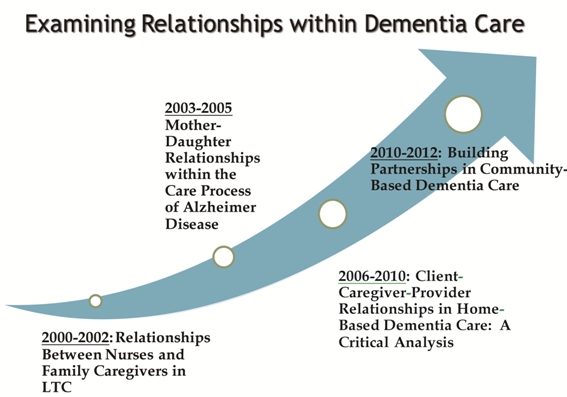
Study 1 [2000 – 2002]
Relationships Between Nurses and Family Caregivers in Long Term Care
Funding: Parkwood Hospital Foundation; Alzheimers’ Society, Brant Chapter
Ward-Griffin, C., Bol, N., Hay, K., & Dashnay, I. (2003). Relationships between families and nurses in long-term care facilities: A critical analysis. Canadian Journal of Nursing Research, 35(4), 150-174.
Although much has been written about the relationship between families and nurses, little systematic analysis has been undertaken of this dyadic relationship in long-term care (LTC). Using a critical ethnographic approach, the researchers conducted separate in-depth interviews with 17 family-nurse dyads caring for residents with Alzheimer disease or a related disorder in one LTC setting. Analysis of interview transcripts and fieldnotes revealed 4 types of family-nurse relationships — conventional, competitive, collaborative, and "carative" — each reflecting the roles of nurse and family, negotiating strategies, and consequences. In addition, it became apparent that intrinsic and extrinsic factors influence the development of certain types of relationships. The findings have implications for nursing practice, policy development, and further research within LTC settings.
Study 2 [2003 – 2005]
Mother-Daughter Relationships within the Care Process of Alzheimer Disease
Funding: The Alzheimer Society of London and Middlesex
Ward-Griffin, C., Oudshoorn, A., Clark, K., & Bol, N. (2007). Mother-adult daughter relationships within dementia care: A critical analysis. Journal of Family Nursing, 13, 13-32
Ward-Griffin, C., & Bol, N. (2007). Mother-Daughter relationships within the care process of dementia: The daughters’ perspective. In I. Paoletti (Ed.), Family caregiving to older disabled people: Relational and institutional issue. (pp. 177-200). New York: Nova Science Publishers
Evidence suggests that intergenerational caregiving between mothers and daughters will become increasingly common, and yet, we know very little about the specific relationships between adult daughters and their mothers with dementia. Guided by socialist-feminist theory and a life-course perspective, 15 mother-adult daughter dyads participated in two individual, semi-structured interviews. Data analysis revealed four dynamic types of mother-daughter relationships: custodial, combative, cooperative, and cohesive. Custodial and cooperative relationships mainly focused on the provision of and receipt of tasks, whereas combative and cohesive are emotion focused. At the same time, custodial and combative relationships are based on deficits compared with strength based cohesive and cooperative relationships. In addition, certain contextual factors, such as expectations of care and levels of support, shaped the development of these relationships. Moreover, study findings highlight a number of implications for practice, policy, and research necessary to support individuals with dementia and their families.
Study 3 [2006 – 2010]
Client-Caregiver-Provider Relationships in Home-Based Dementia Care: A Critical Analysis
Funding: Alzheimer Society of Canada; CIHR (Gender & Health, Aging Institutes); Canadian Nurses’ Foundation
Ward-Griffin, C., Hall, J., St-Amant, O., DeForge, R., McWilliam, C., Forbes, D., Oudshoorn, A., Klosek, M., (2012). Dementia home care resources: How are we managing? Journal of Aging Research (volume 2012), 11 pages, doi:10.1155/2012/590724
With the number of people living with dementia expected to more than double within the next 25 years, the demand for dementia home care services will increase. In this critical ethnographic study, we drew upon interview and participant data with persons with dementia, family caregivers, in-home providers, and case managers in nine dementia care networks to examine the management of dementia home care resources. Three interrelated, dialectical themes were identified: (1) finite formal care-inexhaustible familial care, (2) accessible resources rhetoric-inaccessible resources reality, and (3) diminishing care resources-increasing care needs. The development of policies and practices that provide available, accessible, and appropriate resources, ensuring equitable, not necessarily equal, distribution of dementia care resources is required if we are to meet the goal of aging in place now and in the future.
St-Amant, O., Ward-Griffin, C., Hall, J., DeForge, R., McWilliam, C., Forbes, D., Oudshoorn, A. (in press). Making care decisions: Client-caregiver-provider relationships in home-based dementia care. Canadian Journal on Aging.
The hours of unpaid elder care by family members are projected to triple by 2038. Because living with dementia can inhibit decision-making abilities, family members are often besought to assist in this process. In this ethnographic study, relationships within home-based dementia care were critically examined through face-to-face interviews and participant observations with clients, family caregivers, and home care providers ( n =51). The findings revealed how the formalized home care system contextually imposes decisions, and revealed three themes: (1) accommodating clinically defined competence/ incompetence , (2) making untimely decisions , and (3) reinforcing exclusion in decision making . These themes shed light on how cultural values (competency), beliefs (immutability of the system), and practices (timing of decisions) of the home care system are ultimately deterministic in decision making for persons with dementia and caregivers. Additional attention to the collaborative and inclusive practices of all family members in dementia home care is imperative in order to optimize health.
Forbes, D., Ward-Griffin, C., Kloseck, Mendelsohn, M., St-Amant, O, & DeForge, R. (2011). My World Gets Smaller and Smaller With Nothing To Look Forward To: Dimensions of Social Inclusion and Exclusion Among Rural Dementia Care Networks. Online Journal of Rural Nursing and Health Care, 11(2)
The purpose of this research was to critique the nature of rural dementia care from the perspectives of persons with dementia, their family caregivers and home care providers through a social inclusion/exclusion lens. A critical gerontology approach within a human rights framework (Townsend, 2006) was used. Three rural dementia care networks were included consisting of persons with dementia (n=3), spouse caregivers (n=3), adult children (n=9), grandchildren (n=2) and home care providers (n=3). Thematic analysis (Lubrosky, 1994) revealed three overarching inclusion/exclusion themes. Members of the dementia care network were being denied and afforded opportunities with respect to: (i) experiencing quality relationships among network members; (ii) having a voice in dementia care decisions; and (iii) participating in care, social, and work activities. This study contributes evidence that challenges the myth of the idyllic nature of rural places. Findings revealed the diversity of lived experiences within dementia care network members who described both positive (e.g., close community ties, life-long work opportunities) and negative (e.g., stigma of dementia, dangers of rural setting) aspects of the link between living in a rural setting and living with dementia.
Advocating for Hilda: Advocating for equitable home-based dementia care services.
In the spring of 2010, the investigative team for the Home-based Dementia Care study collaborated with Dr. Mark Speechley – an epidemiologist at Western University’s Schulich School of Medicine and Dentistry by day, a playwright and active member of the local theatre.t. Mark worked with thematic summaries of the data analysis and with the investigative team to develop a two-scene stage play that brings to life the negotiations inherent in home-based dementia care relationships.
In order to invite stakeholder feedback, the first drafts of the stage play were read aloud at two gerontological conferences – the Alzheimer Society (Middlesex-London)’s Annual Caregiver Conference (London, November, 2010), and the Annual Scientific and Education Meeting of the Canadian Association on Gerontology (Montreal, December, 2010). As a result of these -performances, the team modified several lines of the play as well as a number of stage directions.
Currently, with funding support from the Canadian Dementia Knowledge Translation Network (http://www.lifeandminds.ca/), we ‘workshopped’ the play by arranging for community dementia care providers to see the play and to participate immediately afterward in focus groups. The stage play was made into a screenplay so that it will be distributed more broadly.
Study 4 [April 2010 – December 2012]
Building Partnerships in Community-based Dementia Care
Funding: Alzheimer Society of Canada; Canadian Nurses Foundation; CIHR Institute of Aging
Summary of Research
This critical grounded theory research examined the processes by which persons with Alzheimer’s Disease and their family caregivers navigated through and partnered within community dementia care services. Guided by theoretical sampling, this longitudinal study followed six families over a period of 18 months: the person with dementia (when feasible), family caregivers, and in-home care providers and planners were interviewed multiple times. The data were analyzed following the tenets of Charmaz (2011), with a particular focus on examining processes that condition inequitable distribution of and access to community dementia care services. The findings, therefore, are of particular interest to both policy-makers and to families about to embark on a journey into the community dementia care system.
Findings discern and tie-together the sub-processes of anticipating, initiating care, making decisions planning care, evaluating and relating to others, and offer insights into how class, gender, and the aging-at-home discourse intersect to variably shape the paths upon which families navigate and partner with community dementia care services. Moreover, study findings show that the negotiation of intra-familial care relationships is as critical as formal-familial care relationships. Implications from this research centre around relationship-based home care: families are encouraged to develop strategies for partnering – both within their own circle of care and with community care providers; those who allocate services are encouraged to not only be sensitive to families’ educational needs, but also their need for actual hands-on caregiving support and respite. Healthcare leaders whose work focuses on the intersection of policy development, advocacy, and family caregiving are encouraged to attend this session to glean insights into how relationships in home-based dementia care can become more productive and rewarding.
|

